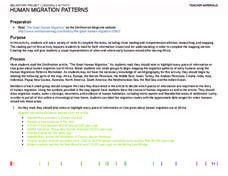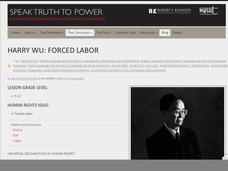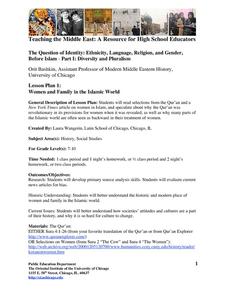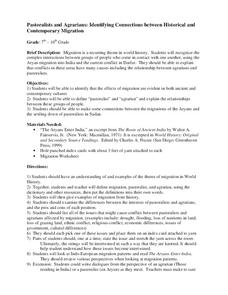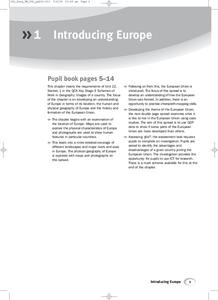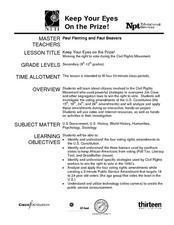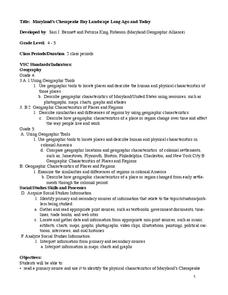Big History Project
Human Migration Patterns
Humans have been on the move for millennia. Using an article from The Smithsonian, pupils chart human movement before written history on a world map. In addition, they examine the modes of transportation used by different waves of human...
University of Arkansas
Our Responsibilities
The fourth in a five-lesson unit examining human rights and personal responsibility asks class groups to investigate a current rights issue, and using the provided graphic organizer, summarize the issue, consider which rights are being...
University of Arkansas
Assessment and Discussion
"Without concerned citizen action to uphold them (human rights) close to home; we shall look in vain for progress in the larger world. . ." Eleanor Roosevelt's comment is used to set the stage for the conclusion of a five-lesson unit...
University of Arkansas
Promises Denied
"Promises Denied," the second instructional activity in a unit that asks learners to consider the responsibilities individuals have to uphold human rights, looks at documents that illustrate the difficulty the US has had trying to live...
Curated OER
The Zabbaleen, Cairo's Garbage Workers
Here is a fascinating human geography study of the Zabbaleen. They are a sub-class of people who work as garbage collectors in Cairo, Egypt. I can't say enough good things about this resource in my limited space here. It is fabulous! If...
Speak Truth to Power
Harry Wu: Forced Labor
Over the course of two class periods, young historians explore human rights issues; specifically, forced labor in China. This resource provides everything you need, including relevant vocabulary, an anticipatory activity, and a...
Smithsonian Institution
Barn Again! Celebrating an American Icon
How do barns serve as a window to a community's past? Here are a series of lessons on the symbolism and historical context of barns throughout American history. Topics include community-building, in-depth primary and secondary source...
National Endowment for the Humanities
Albert Sabin and Bioethics: Testing at the Chillicothe Federal Reformatory
Do the ends justify the means? Getting a drug approved in the US is a long and involved process. But at some point out, it involves testing on humans. The ethics of such testing is the focus of a resource that uses Dr. Albert Sabin's...
Facing History and Ourselves
The Holocaust: Bystanders and Upstanders
Scholars analyze the role of bystanders during the Holocaust. The investigation explores the roles of the bystanders, upstanders, and rescuers with primary and secondary resources to determine actions taken—or not—and their implications...
University of Chicago
Women and Family in the Islamic World
How does the Qur'an detail the role of women? What modern social issues are linked to Islamic law? Address these questions with your young historians through close analysis of primary and secondary source documents.
Mr. Roughton
Pawn Stars: Africa
What element was worth more during the growth of empires in West Africa: gold or halite? After examining various pieces of evidence of primary and secondary source documents placed around the room, your class members will each make a...
Curated OER
Pastoralists and Agrarians: Identifying Connections between Historical and Contemporary Migration
Pastoralists and agrarians, livestock raisers and farmers. Using the conflict in Darfur as a lens, class members investigate the conflicts that arise when these groups are forced to migrate from one area to another.
Curated OER
Teaching Social Studies in English
Case studies, an examination of images, and readings of passages from the UN Convention on the Rights of the Child are used to spark conversations in ESL/ELD social studies classes about this highly-charged topic. Using a variety of...
PBS
Democracy in Action: Freedom Riders
This is a must-have resource for every social studies teacher covering the civil rights movement. Through an engaging video and detailed viewing guide, young historians learn about the Freedom Riders, and discover how everyday...
Geography 360°
Introducing Europe
Provide your learners with a comprehensive introduction to Europe with this great set of worksheets. Map activities include matching European countries to their capitals and places on a political map, as well as exploring different...
Curated OER
Keep Your Eye On the Prize
High schoolers learn about citizens who were actively involved in the civil rights movement, and the strategies they used to overcome the Jim Crow laws that were so prevalent in the 1960s. They investigate the voting amendments of the US...
Curated OER
Maryland’s Chesapeake Bay Landscape Long Ago and Today
Combine a fantastic review of primary source analysis with a study of Captain John Smith's influence on the Chesapeake Bay region in the seventeenth century. Your young historians will use images, a primary source excerpt, and maps...
Speak Truth to Power
Dalai Lama: Free Expression and Religion
How is religious freedom connected to the conflict between China and Tibet? After reading an online passage of background information, your learners will divide into groups and both read and view an interview with the Dalai Lama. They...
Speak Truth to Power
Elie Wiesel: Speaking Truth to Genocide to Power
Invite your learners to discover the efforts of Night author Elie Wiesel to promote awareness of genocide in the world. After watching and reading an interview of Elie Wiesel, high schoolers work to create a living Holocaust museum by...
North Carolina Consortium for Middle East Studies
Voices from the Trans‐Atlantic Slave Trade
Young historians trace the roots of African slavery and learn about the causes and effects of the Trans-Atlantic slave trade through a PowerPoint presentation and by reading and discussing excerpts from the book Copper Sun.
Smithsonian Institution
Dia de los Muertos: Honoring our Ancestors Through Community Celebration
Oral storytelling has been an important part of every culture. The time-honored practice uses stories as a conduit for a culture's values and customs from one generation to the next. Keep the tradition going with a family interview...
Agriculture in the Classroom
Understanding the Columbian Exchange Through Old World and New World Foods
If you're interested in teaching your class about the impact of the Columbian Exchange on contemporary society, this is worth a look. The plan begins with an introduction to the topic, which stems from a cell phone poll...
Library of Virginia
Life as an Enslaved People
As part of a study of slavery in the United States, class members analyze documents related to the sale of slaves. They consider not only the text of the bills of sale but also what the appearance of the broadsides suggest.
Tennessee State Museum
Deciphering the Document: Unlocking the Meaning of the Emancipation Proclamation
Help your learners truly understand the Emancipation Proclamation by asking them the put it into their own words. After reading the document out loud to the class, and briefly discussing the legal language, split your class into small...


